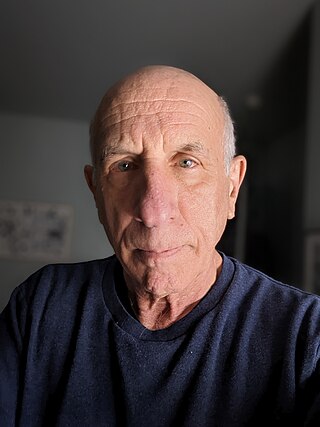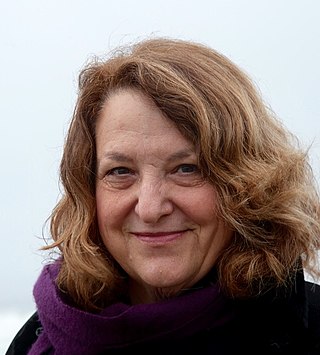
Peter Weibel was an Austrian post-conceptual artist, curator, and new media theoretician. He started out in 1964 as a visual poet, then later moved from the page to the screen within the sense of post-structuralist methodology. His work includes virtual reality and other digital art forms. From 1999 he was the director of the ZKM Center for Art and Media Karlsruhe.
Tamás Waliczky (born in 1959, in Budapest) is a Hungarian artist and animator, known for his new media art.

Kenneth Feingold is a contemporary American artist based in New York City. He has been exhibiting his work in video, drawing, film, sculpture, photography, and installations since 1974. He has received a Guggenheim Fellowship (2004) and a Rockefeller Foundation Media Arts Fellowship (2003) and has taught at Princeton University and Cooper Union for the Advancement of Art and Science, among others. His works have been shown at the Museum of Modern Art, NY; Centre Georges Pompidou, Paris; Tate Liverpool, the Whitney Museum of American Art, New York, among others.

Lynn Hershman Leeson is an American multimedia artist and filmmaker. Her work with technology and in media-based practices is credited with helping to legitimize digital art forms. Her interests include feminism, race, surveillance, and artificial intelligence and identity theft through algorithms and data tracking.
Eyebeam is a not-for-profit art and technology center in New York City, founded by John Seward Johnson III with co-founders David S. Johnson and Roderic R. Richardson.

The Curtis R. Priem Experimental Media and Performing Arts Center (EMPAC) is a multi-venue arts center at Rensselaer Polytechnic Institute in Troy, New York, which opened on October 3, 2008. The building is named after Curtis Priem, co-founder of NVIDIA and graduate of the RPI Class of 1982, who donated $40 million to the Institute in 2004.

Mary Lucier is an American visual artist and pioneer in video art. Concentrating primarily on video and installation since 1973, she has produced numerous multiple- and single-channel pieces that have had a significant impact on the medium.

Beatriz da Costa was an interdisciplinary artist known for her work at the intersection of contemporary art, science, engineering, and politics. Her projects took the form of public interventions and workshops, conceptual tool building, and critical writing.

Aaron Koblin is an American digital media artist and entrepreneur best known for his use of data visualization and his work in crowdsourcing, virtual reality, and interactive film. He is co-founder and president of virtual reality company Within, founded with Chris Milk. The company created the popular virtual reality fitness app Supernatural, which was acquired by Meta in 2023. Formerly he created and lead the Data Arts Team at Google in San Francisco, California from 2008 to 2015.

Marc Lafia is a multidisciplinary artist, filmmaker, photographer, writer, educator, and information architect. He is known for his contributions to the intersection of art, film, and technology. Lafia’s works explore computation and the impact of network culture on media, communication, and the self.

Marie-Jo Lafontaine is a Belgian sculptor and video artist. She lives and works as a Professor of Media Arts at the Karlsruhe University of Arts and Design in Brussels.

Benton C Bainbridge is an American artist known for new media art including single channel video, interactive artworks, immersive installations and live visual performances with custom digital, analog and optical systems of his own design.
Stefan Hechenberger is an Austrian artist and programmer. His works include interactive software, computer vision projects and open-source hardware.
Adrianne Wortzel is an American contemporary artist who uses robotics and interaction between humans and machines in her installations and performances. She has also created many online works.

Heather Dewey-Hagborg is an information artist and bio-hacker. She is best known for her project Stranger Visions, a series of portraits created from DNA she recovered from discarded items, such as hair, cigarettes and chewing gum while living in Brooklyn, New York. From the extracted DNA, she determined gender, ethnicity and other factors and then used face-generating software and a 3D printer to create a speculative, algorithmically determined 3D portrait. While critical of technology and surveillance, her work has also been noted as provocative in its lack of legal precedent.

Addie Wagenknecht is an American artist and researcher living in New York City and Liechtenstein. Her work deals primarily with pop culture, feminist theory, new media and open source software and hardware. She frequently works in collectives, which have included Nortd Labs, F.A.T. lab, and Deep Lab. She has received fellowships and residencies from Eyebeam, Mozilla, The Studio for Creative Inquiry at Carnegie Mellon University and CERN.

Morehshin Allahyari is an Iranian media artist, activist, and writer based in New York. Her work questions current political, socio-cultural, and gender norms, particularly exploring the relationship between technology, history, and art activism. Allahyari’s artworks include 3D-printed objects, videos, experimental animation, web art, and publications. As a 2017 Research Resident at Eyebeam, Allahyari also worked on the concept of "Digital Colonialism"; a term she has coined since 2015.
Sandra S. "Sandy" Phillips is an American writer, and curator working in the field of photography. She is the Curator Emeritus of Photography at the San Francisco Museum of Modern Art. She joined the museum as curator of photography in 1987 and was promoted to senior curator of photography in 1999 in acknowledgement of her considerable contributions to SFMOMA. A photographic historian and former curator at the Vassar College Art Gallery in Poughkeepsie, N.Y., Phillips succeeded Van Deren Coke as head of one of the country’s most active departments of photography. Phillips stepped down from her full time position in 2016.

Leilehua Lanzilotti née Anne Victoria Leilehua Lanzilotti, is a Kanaka Maoli composer, multimedia artist, curator, and scholar of contemporary classical music.
Thom Kubli is a Swiss-German composer and artist known for installation art and sculptures that often deploy sound as a significant element, using digital technologies and material configurations that increase the viewers' spatial perception.














